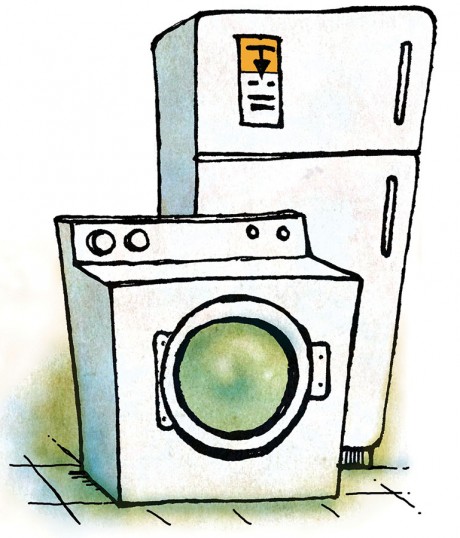4: Modernize major appliances
By Diane Veto Parham | Illustrations by David Clark

Cost: Hundreds of dollars for major appliances; zero dollars for unplugging energy hogs that are not in use.
Benefit: Save anywhere from a few dollars up to hundreds of dollars a year.
DIY potential: You’ll need a professional to install some appliances, but you can unplug small appliances around the house in minutes.
Among your appliances, the two biggest energy users are water heaters and refrigerators, which are nearly always on duty. After that, you might be surprised by another energy hog: consumer electronics.
Think about all the electronic devices plugged into your outlets — many with lights that glow even when the device is not being used — drawing small-but-steady “vampire loads” of energy and adding to your power bill. They include your coffee maker, toaster, phone charger, computer charger, printer, TV, cable box, DVD player and video-game console. A quick walk through the house, unplugging as you go, can save you a few bucks a year on items that only need power when you’re using them.
Water heaters, which keep hot water at the ready for kitchens and bathrooms, are the major household energy users after heating-and-air systems. Saving money here depends on finding the right unit for your home and climate. New efficiency standards instituted for residential water heaters in 2015 ended the use of large-capacity electric-resistance units (over 55 gallons) in homes. An exception was made for grid-enabled water heaters, says Alan Shedd, director of energy solutions for Touchstone Energy Cooperatives, so that homeowners could buy larger heaters to participate in utility load-control programs. To see if such a program is available in your area, check with your electric cooperative.
If you’re not on a tight budget, consider a heat-pump water heater.
“They can cut your water-heating energy costs in half, but they do cost a fair amount up front — probably double,” Shedd says.
Another option to replace a high-capacity water heater is to buy two smaller water heaters, perhaps even installing them closer to where they are needed, he says. The most important consideration is to plan ahead.
“Most times, when a water heater fails, it’s an emergency,” Shedd says. “Nobody wants to be without hot water, so they put in whatever’s on the truck. If you want to upgrade to something more efficient, decide ahead of time.”
Refrigerators are dramatically more efficient than they were two decades ago, Shedd says. “Compared to the 1990s, they probably use half the energy. My computer uses more electricity than my refrigerator does.”
More than a third of American refrigerators in use are over 10 years old, according to the EPA’s Energy Star program. Newer models, especially Energy Star-certified units, use less energy and add less to your household power bill. The program’s website (energystar.gov) has a savings calculator that will tell you just how much money you can save by upgrading.
By the way, that old fridge is still costing you money if you park it in the garage and plug it in there. Recycle it to reduce energy use.
Televisions are bigger and fancier these days; even so, as with refrigerators, new technology makes them more efficient. The same holds for major appliances like washing machines and dishwashers. Age can be your gauge; for appliances more than 10 years old, a newer model, especially one with the Energy Star logo, will use less energy.
-
Share this story:

